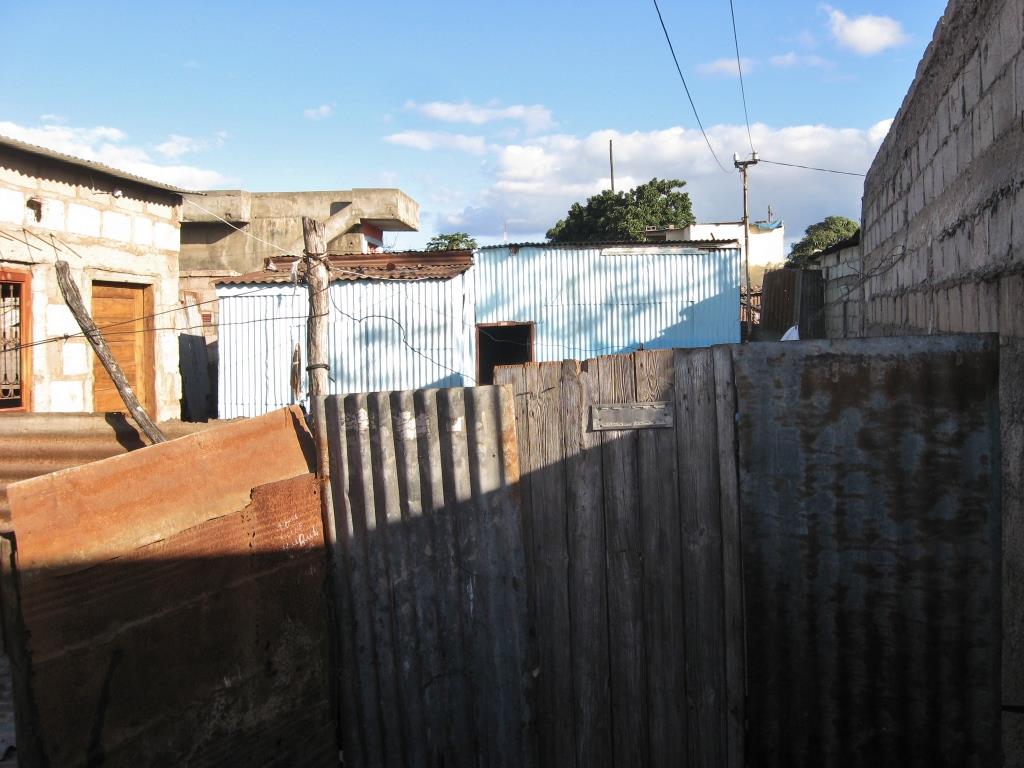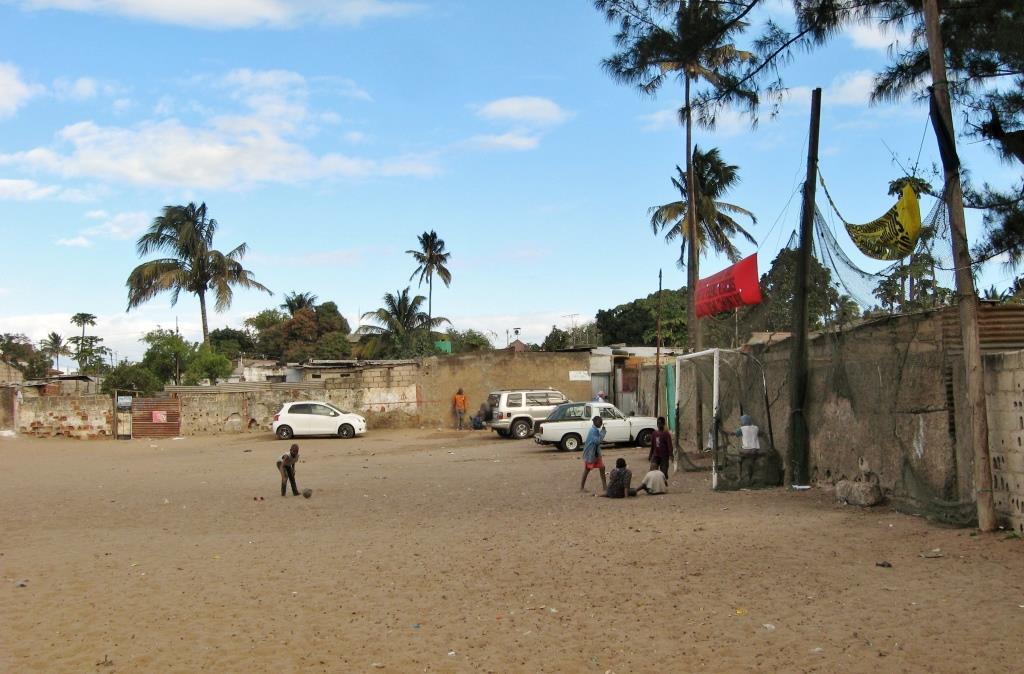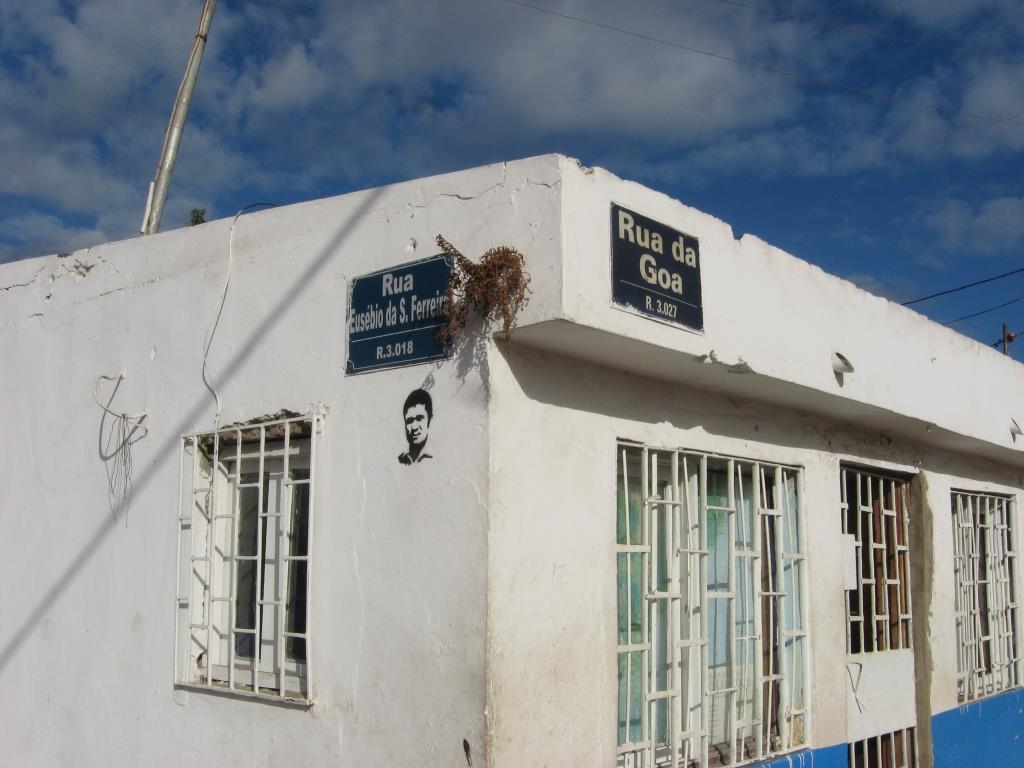Eusébio was one of the heroes of my childhood. Watching the 1966 Soccer World Cup in England on our neighbor’s black and white TV set in Switzerland, all we wanted to see is Eusébio. Eusébio was the dominant player of that tournament, Pelé notwithstanding, and led the Portuguese squad to the third place. We admired the elegance of his play, his speed, and his superb ball control. It is because of players like him that we call soccer the beautiful game. Eusébio died on January 5, 2014.
Eusébio, whose full name was Eusébio da Silva Ferreira, retired from soccer in Portugal in 1975 to play in North America, and I did not think about him much anymore after that. Until 2012, when I took a walking tour through Mafalala, a poor slum of Maputo, the capital city of Mozambique. As I walked across a gravel field, my guide told me that this is the place where Eusébio learned to play soccer and that Eusébio grew up in Mafalala. I was completely surprised–I always had thought of him as Portuguese, and the fact that he was black somehow went unnoticed during my childhood.
Eusébio’s biography is marked by the de-facto Apartheid regime Portugal had implemented in Mozambique at the tail end of Portugal’s global empire. It lasted more than half a millennium and only ended in 1975 when Mozambique became independent from Portugal. The center of Maputo, then called Lourenço Marques, was reserved for whites only. In the 1950s and 1960s, the Portuguese built a large number of concrete highrises along stately avenues in the center of Maputo for a substantial Portuguese population–this is why it is referred to as Concrete City sometimes.
Blacks were not allowed to live there and were relegated to slums without any modern infrastructure. Mafalala was adjacent to the city center and became the focus of black intellectual life during the final decades of the colonial regime. It also was the center of resistance against white rule, and many leaders of FRELIMO, the Marxist liberation movement that seized power after independence, lived in shacks in Mafalala.

Joaquim Chissano (b. 1939), the second president of Mozambique, used to live in the light blue house.
Eusébio moved to Lisbon in December 1960, at age 18, to play for Benfica. Sporting Lisbon, its cross-town rival, had first dibs on him as he played in their youth organization in Maputo. But Benfica outsmarted Sporting, and apparently they convinced Eusébio’s mother with a good bit of cash. Regardless the circumstances, for a kid from Mafalala to play for one of the major European clubs was a dream come true.
In Maputo, Eusébio was subjected to open racism imposed by the Portuguese colonial regime, but he was part of a majority community that gave him support. While the racism in Lisbon may have been less overt, he had no community in Lisbon. So soccer became his community–which he worked for until the end of his life. He remained an untiring soccer ambassador for both Portugal and Benfica, his club, until his death. When Sepp Blatter, the FIFA boss, in 2011 stated that black soccer players just should shrug off racism, thus causing a scandal, Eusébio essentially agreed.
But we know that his 15 years at Benfica were tough, in spite of the huge sportive successes. Portugal then was a fascist state, ruled by António de Oliveira Salazar (1889-1970) and his successor Marcelo Caetano (1906-1980), until the Carnation Revolution of 1974 swept away the dictatorship–which led to the independence of all Portuguese colonies in the following year. The established society always saw Eusébio as an inferior African, and Eusébio also endured racist attitudes at Benfica. But he never talked publicly about his experience with racism–in spite of the fact that he agreed to be ambassador against racism for FIFPro, the global association of soccer players.
His pay at Benifica was far below of what top players elsewhere in Europe earned. Clubs like Inter Milan were interested in him, but Benfica demanded unreasonable amounts of money to release him. Apparently, Eusébio personally appealed to Salazar the dictator to get permission to leave. But Salazar denied the request with the justification that Eusébio belonged to the Portuguese people. Dictators are lousy at understanding irony. And by the time the regime fell, he was 35 and no longer of interest to top European teams.
Eusébio’s biography has a lot more layers of complexity than I possibly could have suspected as kid who admired him. As a victim of a brutal colonial regime, he moved to the racist “motherland” and sought his fortunes there. He never moved back to his native Mozambique where he was admired as a national hero, although he visited often.
It appears that the issue of race was like a festering wound to him–a topic he never wanted to discuss publicly. Donald McRae in a 2006 piece in The Guardian describes Eusébio as a conflicted individual who was haunted by the ghosts of his past and struggled with issues of identity and belonging. Apartheid and the Portuguese colonial rule are gone, but their impacts on lives are real and ongoing. Eusébio is exhibit A. In its obituary, The Guardian writes: “Eusébio was the greatest African footballer in the history of the game.” While this is true, I would have never thought of it this way. The story is more complicated than that.


For the sake of truth, It would be interesting to see some facts to backup what the author here presents!!
It is the first time I ever see “apartheid” liked to the portuguese regime. There were of course abuses by some amongst other racist problems but that was unfortunately a very common fact world wide including In the U.S.
Calling the regime brutal is also not true in comparison to other colonial empires. Portugal recognised citizenship to all African native Portuguese, no matter their skin colour.
Yes, there were no modern basic infrastructures in the slums, but there were modern basic infrastructures in most of Continental or Colonial Portugal.
In the 60’s or 70’s Luanda (Angola) was the most evolved city in the nation. It was much more evolved than Lisbon. Portuguese built other concrete infrastructures in their colonial territories, like dams, roads, churches, postal offices…
40 years have gone by since the Regime was overthrone, still the same political propaganda keeps spreading like wild fire.
-There was no Revolution in April 1974, there was coup d’etat!!
-The reasons behind the African war are not over the liberty of the enslaved african Populations. There were mostly economic and geo-political interests that were backing the guerrilla movements like Frelimo, UNITA, UPA, RENAMO. The Population was not fighting.
– The Portuguese Colonial War is directly linked to the Cold War with the US and Russia backing up different grups, or as nowadays media call them, terrorists. Much like what US did in the 80’s with the Taliban…
– By financing the Portuguese Communist party and PS (Socialist Party), Russia assured that after the coup d’etat in Lisbon all Colonial nations would be handed to their supported guerrilla fractions without free elections, which would lead to decades of Civil War.
From the point of view of the Portuguese regime, the 1974 revolution may have looked like a coup d’etat. But it swept away a dictatorship and actually enabled free elections in Portugal in April 1976–and ever since. Words matter, but in light of the transformation and democratization it ushered in, I still would call it a revolution.
My use of the term Apartheid in the context of Portuguese colonial rule is not novel. Lourenço Marques was a city that was officially divided along race lines, and racial policies in the colony were quite similar to those in neighboring South Africa, and the notorious secret police PIDE committed many crimes against blacks.
I would agree that the civil war between FRELIMO and RENAMO that went on until 1992 was fueled by the Cold War, but the long violent oppression of Africans in Mozambique was a factor as well. Colonialism has been impacting many African countries to this day–just look at the current conflicts in Sudan / South Sudan, the Central African Republic, and in the Congo. But without Soviet support of FRELIMO–for geo-political reasons, as you point out–and the US support for RENAMO it might not have been so crippling for the country, particularly in terms of absent economic development.
Thanks for replying Peter.
Different words, different meanings, not just for one side but for everyone, no?
Its a definition therefore a fact, and it can’t change over a political result.
There was never a revolution in Portugal, it was a political and military strike that put and end to the regime “Estado Novo” in 74. Yes it led to a democracy (against many of the responsible for the coup) but it doesn’t change the history. Because of its strong left political influence, the words revolution were praised on propaganda that took over the Portuguese (mostly uneducated), its media and soon its educational system. Most portuguese don’t even know what really happen in April 74, they do know it meant freedom of speech, and the end of repression.
Yes, I agree that there were areas of white rich native portuguese, and white african portuguese as well.
But there are still areas in my city where areas are determined by race, and this can be found in many city capitals in democratic countries. That however is a social behaviour, nothing to do with the regime or its laws. But if you can link me to a source where I can be proved wrong, please do, I will be glad to learn from it. There was racism in most Portuguese colonies, like there was racism in most countries in the 50’s, 60’s and 70´s. Those were different times. There were US states that had far worst racist problems that in Portuguese colonies.
There was never an apartheid in Mozambique, not even anything close to what happened in South Africa, to state other wise is just false. Not all african countries are alike.
Finally and if by economical development you mean the western companies sucking them dry, well you are right. Unfortunately most people are still poor, except for a few elite with political connections.
Dear Peter Hess,
Thanks for that, As most of us are aware that the pathetic conditions, and their lifestyles they are being lead. A slum is a heavily populated urban informal settlement.
Regards
Kondeti Vijay Satyanand
Something that has always intrigued me is the coincidence that during the 50s and 60s, Benfica and Real Madrid were the biggest forces in European football. And they both were living under oppressive regimes.
Here we have the usual nonsense about Salazar’s Portugal. The regime was not “fascist” – it was conservative authoritarian.
And only a few years ago in Portugal in voting for the greatest Portuguese person ever (Os Grandes Portugueses, RTP) Salazar was the winner, rightfully so.
Also after the disaster that Mozambique’s Marxist regime caused by the late 80s many people there (and in Angola) wanted the colonial government back. The greatest disaster to happen to Portuguese East and West Africa was independence.
Absolute bullshit and nonsense Maria Peixoto Dos Santos.
Mozambicans had enough of you portuguese undermining people.At least the British Empire recognised you as human and even allowed you to sit at the table for intellectual debate.The portuguese were brutal and till this day treat mozambicans and any other africans as less than human.Mozambicans are a beautiful people and they don’t need your approval or your white supremacy.
Your arrogance and thinking your superiority complex is why you have no empire.So please crawl back under your racist rock and never show yourself here again.